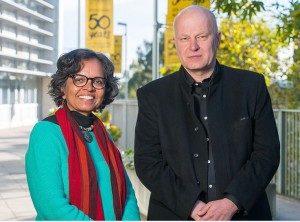[article by Office of Communication and Engagement, Flinders University]

The use of progressive visual support for children with autism who are minimally verbal was explained in workshops at Flinders University this week.
Visiting international researcher Professor Ralf Schlosser, from Northeastern University & Boston Children’s Hospital in the US, gave several workshops to students and staff and a public lecture at Flinders at Victoria Square Adelaide on 15 June.
“Some of our minimally verbal kids aren’t doing very well in classrooms, where instructions are usually all verbal,” Professor Schlosser says.
“With both dynamic (video clips) and static (pictures and graphic symbols) visual cues, there can be many benefits for those who don’t do very well with the spoken language.”
The latest mobile-based technologies, phone apps, and general consumer-level devices such as iPads, Apple Watch and the Amazon Echo, offer a new range of options for creating rich visual environments and “just-in-time” (JIT) supports, he says.
Professor Schlosser is an author of a new book covering emerging Augmentative and Alternative Communication (AAC) techniques, called Enhancing Communications for Individuals with Autism – A Guide to the Visual Immersion System (VIS).
VIS is described as “a practical, research-based intervention framework that taps into the strong visual processing skills of many children on the autism spectrum.”
Associate Professor Pammi Raghavendra from the School of Health Sciences Disability and Community Inclusion Unit, said Professor Schlosser’s approach is “novel and exciting”.
“Professor Schlosser’s research in using commercially available, wearable and easily usable mobile technologies for supporting students with autism to enhance communication and ability to understand spoken language,” Associate Professor Raghavendra said.
“Flinders students in various disciplines such as teaching, disability and developmental education, speech pathology, etc. would also benefit from learning about these innovative approaches.”
She said the research seminar and master class were very informative. The seminar provided strategies to find evidence-based information sources in allied health, and the master class covered designing and appraising single-case experimental designs.
School of Education Senior Lecturer Dr Julie McMillan said the JIT supports presented by Professor Schlosser, demonstrated how mobile technologies have the potential to promote independence and participation in education.
“Such mainstream ubiquitous technologies could potentially reduce the need for obtrusive adult proximity while still providing essential learning cues for independent school participation,” Dr McMillan said.
[A/Professor Pammi Raghavendra is also a member of the Medical Device Research Institute (MDRI) at Flinders University]

